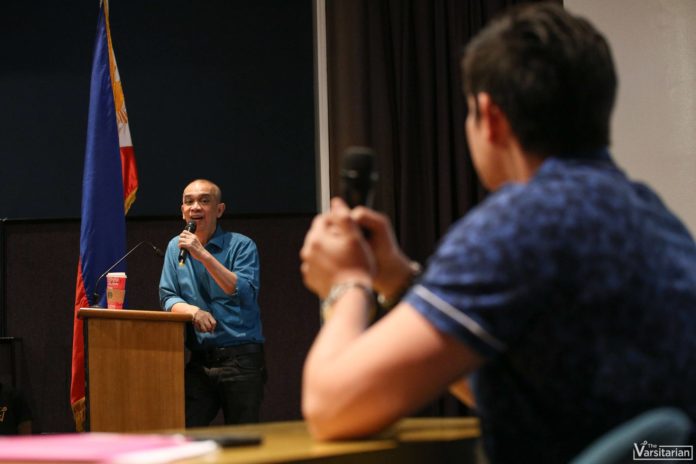Editor’s note: This story was rewritten to correct a misinterpretation of the views expressed by the resource persons interviewed.
TWO JOURNALISM professors are taking issue with the low accreditation standards set by the Presidential Communications Operations Office (PCOO) for bloggers and social media users who want to cover President Rodrigo Duterte.
While not in principle opposed to letting bloggers cover Malacañang, veteran journalist Nestor Cuartero, instructor at the Faculty of Arts and Letters, said recklessness and irresponsibility in news coverage were problems that could arise as a result of accrediting untrained writers.
“[Bloggers] work independently and don’t have media hierarchy. They write as they please, they are their own bosses, so the recklessness and irresponsibility commonly attached to bloggers should be watched out for,” Cuartero told the Varsitarian.
Cuartero said the simple requirements for Palace accreditation, like having 5,000 followers in a social media platform, were very alarming.
“[These simple requirements] are frightening because in traditional media, the Malacañang beat is a highly regarded territory. Before you get to that level, you have to go through the ranks. [It is the] pinnacle of your reporting,” he added.
Danilo Arao, journalism professor at the University of the Philippines, said these “low standards” for accreditation would cause a “nightmare” for PCOO.
“Given the lower standards, there will be a logistical nightmare for PCOO. It is possible for the more competent [bloggers and social media practitioners] to be in the company of trolls and incompetent, free-loading individuals,” he said.
Arao said the PCOO should ensure that the bloggers seeking media passes could write and research well.
Thomasian alumna Rebecca Añonuevo, who had worked for the PCOO, echoed this concern, saying that quality of writing, content and reader engagement of each blog must be examined first.
“Writing is a serious profession, blogging is just a new form. Government should check the record of published articles by bloggers,” she said in an interview.
On Aug. 8, Palace Communications Secretary Martin Andanar signed Department Order 18 titled “Interim Social Media Practitioner Accreditation.”
It states that any Filipino citizen at least 18 years old, with more than 5,000 followers in any social media platform, can cover events of President Duterte.
‘Nothing wrong with being inclusive’
There is nothing wrong with being “inclusive” and giving bloggers access to the President, but the department order is not progressive as it allows any “net-savvy individual” to enter Malacañan Palace, Arao said.
“The bloggers and social media users could help expand the reach and perhaps engage in fact-checking the news media organizations,” he said.
However, this cannot happen if the ones accredited are ignorant of objective coverage, the UP professor added.
Cuartero said bloggers could be given a chance if properly screened by the communications office.
“If properly screened, [bloggers and social media users] should be given a chance because maybe there are some who are responsible,” he said.
Añonuevo said bloggers and social media practitioners could even break the monopoly of established media on public discourse.
“[W]hy be afraid of a new sector in information-building or shaping of opinion? I am excited by the fact that at last institutions have no more sole control of information or truth, according to their privileged version,” she added.
Bloggers or social media personalities who want to cover presidential events have to apply for accreditation with the Palace Social Media Office headed by Mocha Uson, a prominent online Duterte supporter.



















